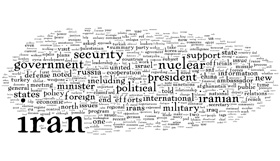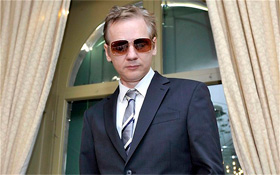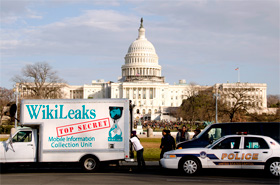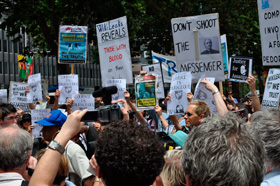In the modern global political system, where a major participant in the international arena is the state, public diplomacy alone cannot be a substitute for classic diplomacy, but it is a significant competitor. At the same time, classical diplomacy finds itself increasingly less effective without the support of informal structures. What are the prospects of this symbiosis and how is the emergence of new communication technologies affecting the style of public diplomacy?
The phenomenon of WikiLeaks is a new word in public diplomacy?
The idea of open diplomacy, from which came WikiLeaks and J. Assange’s idea to make how international affairs are carried out available to the public was taken from the past. It is possible to remember Woodrow Wilson’s speech before the U.S. Congress in January 1918, which he called "Fourteen Points", and in the first paragraph he advanced the requirement for "publicly available peace treaties ... after which there will be no secret international agreements of any kind, but diplomacy will always act openly and in full view of everyone." [1]
Interestingly enough, almost at the same time the Soviet government came up with a similar product. In December 1917, the People's Commissariat for Foreign Affairs, headed by L.D. Trotsky, began publishing the Tsar's treaties. [2]
In professional diplomatic circles, the idea of a "diplomatic openness" was not met with any enthusiasm. In Russia, there were attempts to prevent the publication of the royal documents, and the British diplomat and author of many books on Diplomacy, Harold Nicolson wrote that "any negotiations consist of certain stages and a final result. If these stages are the subject of public dispute, when there is no final result, the negotiations will almost certainly be doomed to failure." [3] The same thought was later formulated in a metaphorical form by U.S. researchers, M. Berman and W. Zartman, who formulated the negotiation process as follows: in the case of open negotiations, the participants begin to be drawn "towards the windows," and not to each other. [4] In other words, the actions of diplomats are aimed at the audience, not the solution.
There is another aspect of the problem of such openness. Following the publication by WikiLeaks of the Afghan dossier backlash followed, not only from the formal structures of the USA (which was expected), but also from a number of human rights organizations, including Amnesty International. Why? The fact was that many people who somehow collaborated with the Americans in Afghanistan were put in jeopardy.
Finally, did the publication of WikiLeaks contribute to the creation of an atmosphere of trust among nations? In all likelihood, no. At best, it did not change anything, at worst impartial assessment officials were angered and it affected the perception of the United States as a whole.
So, in terms of the idea of opening up diplomatic activities WikiLeaks was, first of all, not new, and secondly had a series of negative aspects. Thirdly, this activity had no relationship to public diplomacy, which, by definition, should be aimed at forming and strengthening trust between nations. The activities of WikiLeaks bore rather the character of a quasi-public diplomacy.
Why is there such resonance around the effect of WikiLeaks itself and why has J. Assange acquired many supporters? There are several reasons, including the anti-American sentiment around the world. But, it seems, there are more important reasons. One of the most important things is that WikiLeaks has shown by example how a small group of people (almost one person with a few assistants), not having significant material resources, proved to be politically influential, and forced people to talk about them all over the world.
Such an opportunity arose due to the development of modern communication and information technologies, and allowed information being gathered and made publicly available in such a way that it was almost impossible to "remove" it from the network.
Another reason for the popularity of WikiLeaks is the scandal which is accompanied by the appearance of the materials on the Internet. And the fact that J. Assange is an unofficial person had a minimum value. If he had been someone who worked in the formal circles the effect would probably have been the same even though the punishment may have been different.
The prospects for the development of public diplomacy and the lessons from WikiLeaks
For about the last two decades there have been a lot of new things in diplomacy. Among them, one of the most important one was that diplomacy was becoming more focused not only on a multilateral simultaneous participation of several countries in addressing an issue, but also multi-level interaction, which could include a variety of states, international organizations, businesses, nongovernmental organizations and etc. Non-state participants are the basis of public diplomacy, and each of them is aimed at a specific interest groups. Environment forums or forums to regulate the Internet serve as examples of multi-level diplomacy.
In the modern world political system where a major participant in the international arena is the state, public diplomacy alone cannot be a substitute for classic diplomacy, but it is a meaningful competitor. At the same time, classical diplomacy finds itself increasingly less effective without the support of informal structures. This symbiosis (but not identity) will likely only grow. In the future, the effectiveness of diplomatic efforts will be increasingly dependent on interaction with the structures of public diplomacy. Is the emergence of new communication technologies affecting the style of public diplomacy?
If we talk about the development of informal activity in the international political arena, we should bear in mind the following considerations.
First. The international activities of various organizations and individuals will increasingly expand. Modern means of communication open up great opportunities for this. However, public diplomacy does not necessarily mean any activity by unofficial persons and entities in the international arena. And it is very important to understand this difference.
It is necessary to distinguish three forms of international activity of individuals and informal structures, each of which will eventually evolve rapidly. First, there is public diplomacy which aims at improving the international atmosphere and mutual understanding between peoples, or the solution of international problems, and has no relation to the scandals and is largely focused on the same principle as that of medicine - "first, do no harm". This, of course, does not mean avoiding criticism of the authorities.
Secondly, contacts between people in various professional, cultural and sports exchanges, tourism, etc. Such contacts are not intended to direct public diplomacy, but they can contribute to or, conversely, prevent the establishment of mutual understanding between peoples. In this sense, such contacts are part of public diplomacy.
Thirdly, quasi-public diplomacy, which a priori is based on the presence of a confrontation with official diplomacy. Whatever is intended as "private matters" and J. Assange’s, attempts to publish such documents related to the international sphere with the help of modern media technologies is unlikely to be avoided in the future. However, to reduce the scale and the negative implications of new “WikiLeaks” is apparently possible through the development of real public diplomacy.
Second. In order to adequately act in the international arena through public diplomacy, it is important to know and understand international relations and world politics. Of course, the people involved in public diplomacy are not required to have appropriate professional education, but they have to possess the minimum required knowledge.
Unfortunately, the modern system of education in Russia is such that no Russian schools or universities (unless it is the faculty of International Relations) are focused on international issues.
It is fair to say that a similar situation can also be observed in the American educational system. For example, American researchers J. E. Dibbern and D. J. Whelan analyzed the bachelor programs in U.S. universities and found out of 35 randomly selected universities in the USA only 23 (i.e. 66%) offered courses that included the study of global issues, as well as the characteristics of other peoples and cultures. But even in those universities where such courses were offered, their number was limited to two or three and they did not involve the question of politics and international relations. [5] All this only aggravates the overall situation.
Third. The power of public diplomacy has more weight than that of official. Due to the variety of forms and methods of operations it is able to work on different sections of the population. It is this impact on large numbers of people (that diplomats simply cannot reach), that allows public diplomacy to be able to shape up and change the image of the state.
But all this is the traditional "attributes" of public diplomacy. In the twenty-first century these were supplemented with the new, greatly increased possibility of public diplomacy. Here, above all, we are talking about social networks, information and resource mobilization which were very clearly manifested in the "Arab revolution". But this was a mobilization at country level, although the demonstration effect of some countries turned out to be effective for others. It is difficult to say whether social networks can play a similar role in the mobilization of world politics in general. But this is a link that requires special attention.
Where Russian public diplomacy is concerned, it still loses out in terms of effectiveness to the west in many ways, including activity, independence, diversity of forms and methods of work, finding sources of financing, project work (rather than individual events), etc. Although in American public diplomacy, which is probably now the most advanced in the world, there are still many unresolved problems.
However in general, the formation of Russian Public Diplomacy (unfortunately, it is still at this stage) and its further development will be largely determined by whether official diplomacy will treat it as a partner rather than a means of implementing its objectives. Otherwise, Russian public diplomacy will retain a sham role, and the potential effectiveness of official diplomacy will be significantly reduced.
1. B. Wilson Fourteen Points of U.S. President Woodrow Wilson on the conditions of peace. Message to Congress on January 8, 1918 / System History of International Relations, in four volumes. 1918 - 2000. Volume 2. Documents 1910 - 1940's. M. 2000. Pp. 27 - 28.
2. Voronin, IA The first publication of the People's Commissariat of Foreign Affairs (1917-1918) / / International Affairs. - 2003. - N 2. - S.. 115-122.
3. G.Nicholson The diplomatic art. - M.: Institute of International Affairs, 1962. - S. 92.
4. Zartman I.W, Berman M.R. The Practical Negotiator. - New Haven: Yale University Press, 1982.
5. Dibben J.E., Whelan D.J. US Undergraduate General Education Curriculum Review. Paper prepared for APSIA Meeting, December, 2005.








